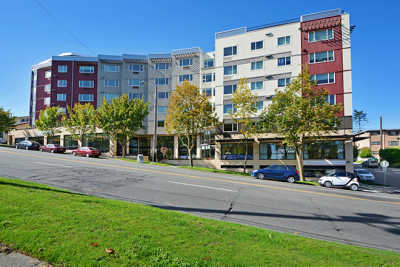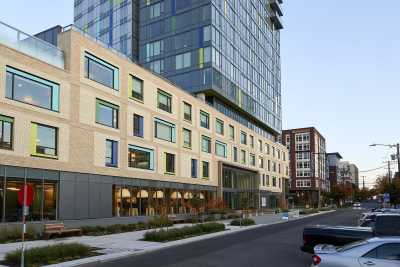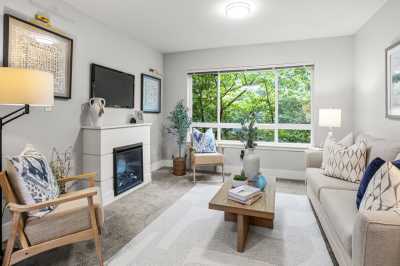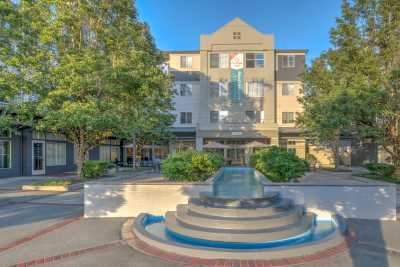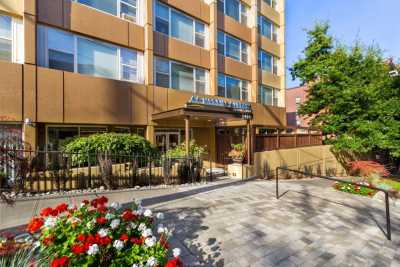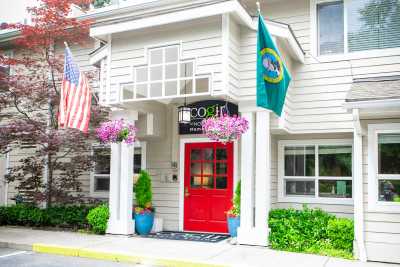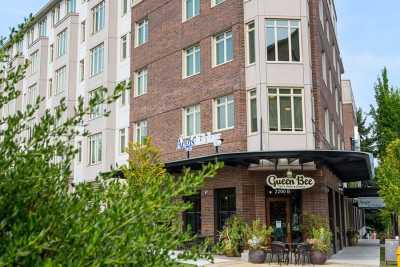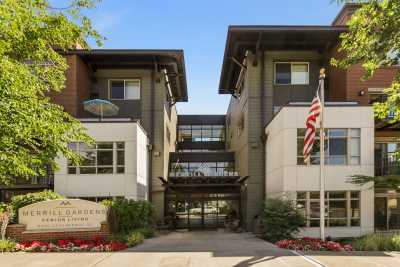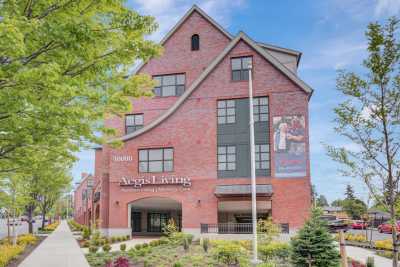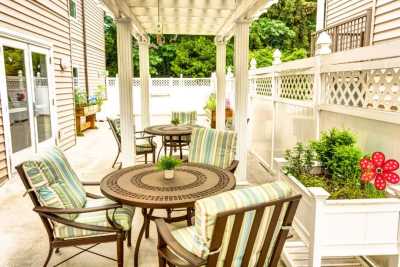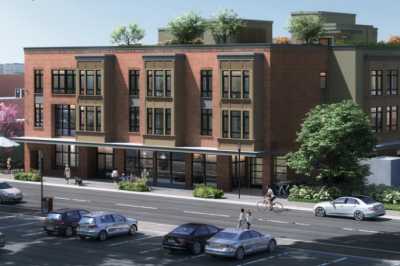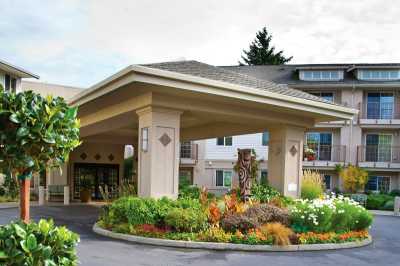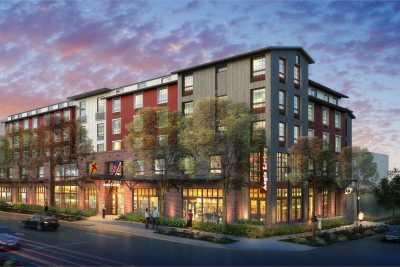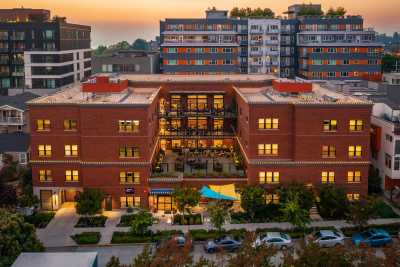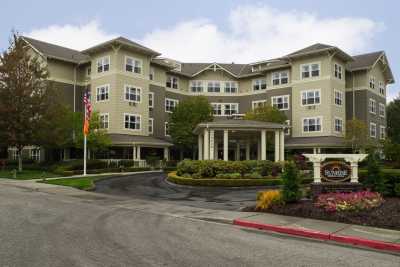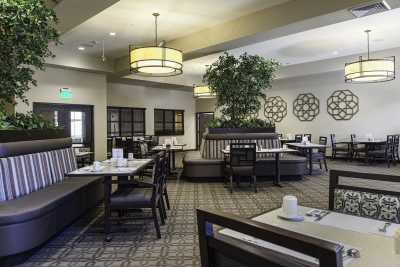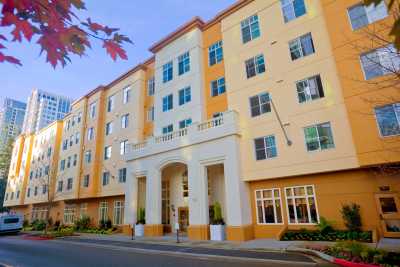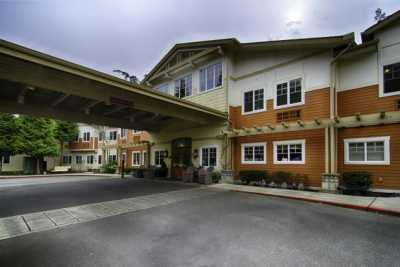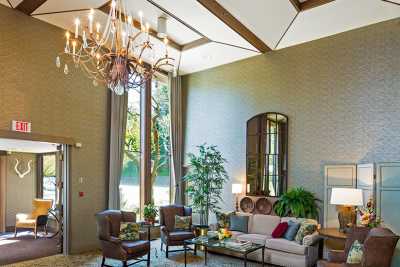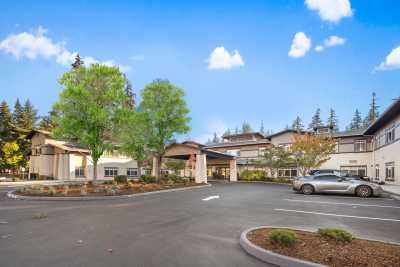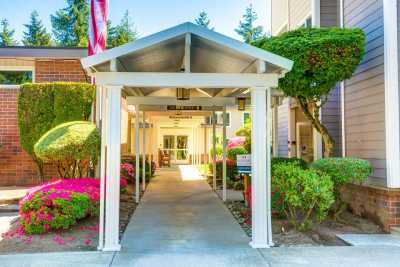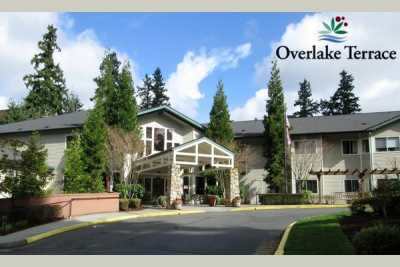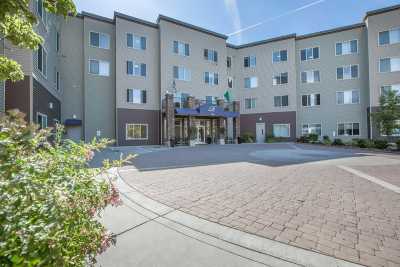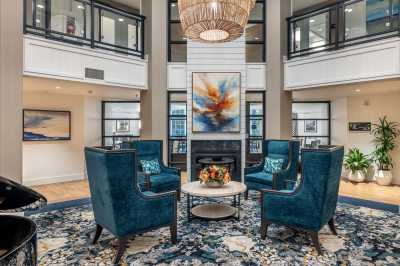
10 Best Memory Care Facilities in Seattle, WA
A city with world-class health care and plenty of community resources for people living with memory loss, Seattle is a great option when looking for a memory care facility for a loved one. Memory care is a good option if a person has Alzheimer’s or dementia, as it can provide services unique to these challenges, including the following:
- Enhanced security and supervision
- Memory-enhancing activities
- Personal care assistance
- Medication management
Searching for a memory care option for your loved one can be stressful and sometimes complex. In this guide, you will learn about what makes a great memory care facility, what you need to know about paying for memory care, and the activities and amenities available for people in Seattle.
With 99 A Place for Mom partner facilities within a 10-mile radius of downtown Seattle — two-thirds of which are group homes — there are plenty of opportunities to find the right fit for your loved one.
Seattle Memory Care Facilities | 1114 Reviews
I am very pleased about how everyone is so friendly! The opportunity to ask for anything from books to read to help if I fall or become ill. I am happy here.
The staff there are really great, and turnover has been relatively low, which means the people who care for mom on a daily basis are very familiar with her needs. Also, she has friendly people dropping in to...
I picked this community because of the gorgeous large apartment with high ceilings and big windows surrounded by beautiful trees including some cherry blossoms. It's like living in a tree house! Winter views...
He's been Northgate Plaza three months so far so good. He is tough but they still keep him. I like the overall feel there and like I say he seems good and engaged. Happy with the food and activities and...
We only toured 3 or 4 facilities and all most were lovely but Merrill Gardens had a vibrancy that wasn't present at the other facilities. I think my mom would have enjoyed living with these people....
It has been a great experience with Cogir of Northgate Memory Care. They deliver good quality care at a premium price. I would highly recommend this facility to those looking for memory care.
Staff are extremely friendly. The shared spaces such as the library, theater, and entrance are inviting and beautifully maintained. We enjoy the terrace too!
My older sister has been at the MG / University for 10 years. She had been living on her own but suddenly found herself needing a little more community support. The staff at MG is amazing - providing support...
The staff in the memory care unit was as caring as any staff could be,. They took my dad on trips as long as he was able. But don't think that you can leave all the care of your loved one up to any staff....
Most staff are friendly. Due to staffing shortages some are abrupt. Staffing shortages and language barriers lead to some difficulties. Meals were adequate in calories but lacking in taste and variety. The...
Our free advisors can help
- Compare local facilities
- Determine care type
- Schedule tours
- Evaluate pricing
I was looking fir an assisted living community that was comfortable, convenient and served excellent meals. I found this but what really surprised me was how many friendly, interesting residents I got to...
Beautiful dining room with view of Lake Washington. Grounds beautiful and well taken care of. Staff is friendly and kind. Secure with gated entrance. Some menu options are very good - maybe rotate menu...
My sister is the 3rd resident in the newly opened Memory Care in Aegis Living Ballard. The facility is beautiful, the staff are amazing, and the food is delicious. If your loved one needs Memory Care...
Everyone we've had contact with at Quail Park is very nice and has treated our parents that live there with kindness and compassion. The move-in process went quickly and smoothly. The meals look appealing...
I just wanted to say that it was so wonderful to find COGIR of Edmonds for my disabled/ onset dementia young brother who’s only 62 yet found a loving family in COGIR of Edmonds. There’s consistently meals...
The staff keeps me well informed of my dad's status. They have several activities available each day and frequent outings, which are important to us as dad is very social. I would recommend the facility to...
The staff are honestly LOVING. They care deeply about the residents and are so warm and kind with our entire family. My mother in law is entirely comfortable with the care she receives, and she needs help...
The Gardens has been a wonderful experience all the way around & if we were doing it all over again, we would do everything exactly the same. There may be options that cost less but I believe we are getting...
[name removed] left the lodge in the early summer to return to her own home. The Pt program and the food were outstanding. Unfortunately the discharge planning and support for return home were non-existent....
Our family very much appreciated Madison House while Grandma was living there. The caregivers took amazing care of her. Always respectfully and with kindness. I slept well knowing she was looked after and...
Staff is friendly. The residents, like most 'dorm ' living situations, vary in personality & temperament. This makes for a challenge in getting along. If you participate in the activities, the cost is...
Sagebrook made me feel at home and that they cared about my experience as well as my wife's. Although my wife had stopped being responsive to care, they went out of their way to attempt to reach her and...
She's done really great there. We're very happy. It is a much better experience than her previous facility. Very friendly staff. Great help and assistance. Love all the activities. Very easy to get...
Everyone at Regency Newcastle was very nice and I did enjoy meeting people from all walks of life. I would recommend this community to other families based on the experience I have had.
The first visit to Cogir of Kirkland was a lovely experience. It immediately told me that it was a must to visit again. - second visit, an available room was shown, however, there were concerns -...
Our methodology
How we rank order the Seattle community options above
We developed a proprietary recommendation system that orders Seattle community options based on factors we know are important to seniors and their families:
- Proximity to your search location
- Availability of recent, high-quality reviews
- The amount of detailed community information available
Where we source our information
14,000+ communities
We collect proprietary data from our network of 14,000+ senior living communities in the U.S., with regular refreshes of data and information
350,000+ reviews
We have 387,000+ reviews from senior living residents and family members that provide first-hand accounts about senior living communities
- Costs of memory care in the Seattle area
- What families are saying about memory care in Seattle
- How people pay for memory care in Seattle
- Understand Washington’s laws and regulations for memory care facilities
- What to expect from memory care living in Seattle
- Seattle memory care services and amenities
- Explore senior care with confidence
- Unfamiliar with Seattle? Highlights for seniors
Costs of memory care in the Seattle area
Based on proprietary data from A Place for Mom, the average memory care cost within our network of partners, including associated fees and service fee add-ons, is $6,508 per month. While these costs will change based on location, floor plan, amenities, and additional services, Seattle’s memory care costs around $1,000 more monthly than the national average.[01]
As with most memory care facilities, these communities provide enhanced security and support the unique needs of Alzheimer’s and dementia patients. These services include the following:
- Medication management
- Activities designed to improve memory
- Support with personal care and mobility assistance
- Around-the-clock supervision
The following costs for Seattle facilities are average memory care costs and do not include additional fees or add-ons.
Average monthly cost of Memory Care in Seattle, WA vs. nearby cities
Average monthly cost of Memory Care in Seattle, WA vs. the state and national average
Average monthly cost of Memory Care in Seattle vs. other types of senior living
Median monthly costs of Memory Care in Seattle, WA by room type
Average cost of Memory Care in Seattle over time
What families are saying about memory care in Seattle
Recent reviews for memory care in Seattle
Aegis at Marymoor in Redmond
Regency Newcastle
MorningStar at Silver Lake in Everett, WA
Reviews mention these favorite features of communities
Seattle review score based on 220 family reviews
This proprietary review score is based on 220 reviews of 93 Seattle memory care communities. All reviews were submitted in the past two years by verified community residents and family members.Seattle review score compared against nearby cities
Review subcategories for Seattle memory care
When memory care residents and family members submit a review on our site, they rate each community on categories such as cleanliness, activities, meals, and more. The chart below is based on 220 reviews of 93 Seattle memory care communities. This chart helps you compare Seattle resident and family memory care satisfaction rates against national averages. Use it to assess your needs and develop criteria for your own search. If you know that one of these categories is important to you or your loved one, our senior living advisors can help you find communities to match your needs.How people pay for memory care in Seattle
There are several ways families can pay for memory care through private savings or public assistance. In this section, you will learn more about the different ways people can pay for memory care, from private pay methods to utilizing Medicaid, Medicare, or VA benefits.
For those who want to privately fund memory care, using savings and pension accounts, Social Security benefits, and investment returns are all common options. Some additional ways families can privately pay for memory care include the following:
Veterans can use several local and national resources to support and pay for their time in memory care. While government-organized local veteran programs like King County Veteran Services and the Washington State Department of Veterans Affairs (WDVA) provide financial assistance and home modifications for some long-term care services, additional local VA assistance programs exist.
Disabled American Veterans (DAV) has a Seattle chapter that provides support related to VA benefits claims, appeals, transportation, and more. In addition, the Veterans of Foreign Wars and American Legion Department of Washington both assist with claims and appeals and also offer other support and advocacy for veterans and their families.
A popular option for families is the Aid and Attendance benefit, which contributes to expenses that improve quality of life. This benefit is in addition to the VA Pension. People who don’t qualify for the Aid and Attendance benefit may be eligible for the Housebound allowance, which helps cover costs associated with in-home health care services. Most of the resources we’ve provided in this guide will be able to help you determine whether a veteran is eligible for either of these benefits.
Applying for VA benefits can be a time-consuming process, so it’s wise to reach out to local resources before applying for benefits.
Number of veterans who live in Seattle
Percentage of Seattle veterans who are 75+, according to the US Census Bureau
Resources for Seattle veterans
Washington State Department of Veterans Affairs
1102 Quince St. SE
Olympia, WA 98504
Phone: 1-877-838-7787
Email: benefits@dva.wa.gov
King County Veterans Services Program
Department of Community and Human Services
9725 3rd Ave. NE, Suite 300
Seattle, WA 98115
Phone: 206-263-8387
Hours: Monday through Friday, 8:30 a.m. – 4:30 p.m.
Ballard Eagleson Veterans of Foreign Wars Post 3063
2812 NW Market St.
Seattle, WA 98107
Phone: 206-782-8618
Email: adjutant@vfwseattle.org
Hours: Thursday and Saturday, 11 a.m – 3 p.m.
The American Legion Department of Washington
3600 Ruddell Road SE
Lacey, WA 98503
Phone: 360-491-4373
Fax: 360-628-8364
Disabled American Veterans
915 Second Ave.
Room 1040
Seattle, WA 98174
Phone: 206-341-8267
Phone: 1-888-604-0234
Hours (by appointment only): Monday, Tuesday, Thursday, Friday, 8 a.m. – 2:30 p.m. and Wednesday, 8 a.m. – 11:30 a.m.
The Seattle Public Library Veterans Services
1000 Fourth Ave.
Seattle, WA 98104
Phone: 206-386-4636
Hours: Thursdays and Saturdays, 10 a.m. – 6 p.m.
In Washington, Medicaid is known as Apple Health and will pay for some memory care costs depending on the resident’s care needs and income. Washington has the Specialized Dementia Care Program, which provides Medicaid funding for people with dementia who can no longer live at home. Services in this program can include the following:
- Medication management
- Nursing services
- 24/7 staffing and supervision
- Safe outdoor environments to walk securely
For support with necessary in-home care services, families may be able to apply for help through Home and Community Based Services (HCBS) Waivers, which allow states to use Medicaid funding to support eligible seniors in memory care facilities.
Navigating Medicaid can be tricky, so several local organizations are available to help families navigate the eligibility and claims processes. The Aging and Long-Term Support Administration (ALTSA) is a valuable resource while looking for the right care option. Washington’s local ombudsman is also vital for navigating the complaints and appeals process. To get help determining eligibility for a variety of benefits and programs, Washington’s Community Living Connections (CLC) Network can help.
Seattle resident Medicaid resources
Washington Apple Health (Medicaid)
Cherry Street Plaza
626 8th Ave. SE
Olympia, WA 98501
Phone: 1-800-562-3022
Hours: Monday through Friday, 8 a.m. – 5 p.m.
Aging and Long-Term Support Administration Home and Community Services
1737 Airport Way
S Suite 130
Seattle, WA 98134
Phone: 206-341-7600
Hours: Monday through Friday, 8 a.m. – 5 p.m.
Washington State Long-Term Care Ombudsman
1200 S 336th St.
Federal Way, WA 98003
Phone: 206-623-0816
Medicare, the federal health insurance program for people over the age of 65, is an option for Medicare beneficiaries with an Alzheimer’s or dementia diagnosis but will only cover certain costs. For example, Medicare doesn’t cover the costs associated with memory care for people with Alzheimer’s or dementia, but it can help pay for other services related to dementia care:
- Inpatient hospital care
- Physician’s fees
- Medically necessary items
- Short-term nursing care
- Some care if a person is admitted to a memory care unit
The type of support families can claim will depend on whether a person has Medicare Part A or Part B. Part A generally covers inpatient and home health care. In contrast, Part B covers outpatient services, diagnostics, and some forms of therapy.
The Statewide Health Insurance Benefits Advisors (SHIBA) in Washington offer free and confidential assistance with Medicare, while other programs like the Medicare Savings Program can help eligible people with costs related to Medicare fees and deductibles. Note that it is actually administered through the state’s Medicaid program, Apple Health. The Pharmaceutical Assistance Program can help defray prescription drug costs.
Washington residents can also contact their local Social Security Administration and ombudsman for information, advocacy, and support.
Seattle resident Medicare resources
Seattle Social Security Administration
Suite 901
915 Second Ave.
Seattle, WA 98174
Phone: 1-800-772-1213
Hours: Monday through Friday, 9 a.m. – 4 p.m.
Statewide Health Insurance Benefits Advisors
1501 N 45th St.
Seattle, WA 98103
Phone: 206-753-4806
Office Hours: Monday through Friday, 8 a.m. – 5 p.m.
Aging and Long-Term Support Administration
1737 Airport Way S, Suite 130
Seattle, WA 98134
Phone: 206-341-7600
Office Hours: Monday through Friday, 8 a.m. – 5 p.m.
Washington State Long-Term Care Ombudsman
1200 S 336th St.
Federal Way, WA 98003
Phone: 206-623-0816
Providence ElderPlace (PACE)
4515 Martin Luther King Jr Way S
Suite 100
Seattle, WA 98108
Phone: 206-320-5325
Hours: Monday through Friday, 8 a.m. – 4:30 p.m.
Understand Washington’s laws and regulations for memory care facilities
Washington’s Department of Social and Health Services (DSHS) is responsible for regulating memory care facilities, which must be licensed and are regularly inspected to ensure compliance in medication management, safety and security protocols, resident care, and more.
There are two types of facilities for memory care: adult family homes and assisted living facilities. And each type has its own set of requirements.
Adult family homes in Seattle
An adult family home is licensed to provide housing and care for up to six adults in a regular house within a residential neighborhood. In these types of homes, staff members assume responsibility for the well-being and safety of residents. Adult family homes are required to be well-maintained and provide a sanitary and safe environment for residents, and they must ensure staff members receive the necessary training to care for residents. They have to have fire safety and accessibility (for both mobility and communication) measures in place, offer nutritious foods, establish health care procedures for all residents, offer activities, and ensure financial solvency.
To find out more about the license of an adult family home specializing in memory care, you can visit the Washington State DSHS website. From there, you can also look up inspection reports and other records. Just click “advanced AFH search”; search by county, city, or ZIP code; and select “Dementia Care” under “Specific Criteria.”
Assisted living facilities in Seattle
An assisted living facility is licensed to provide housing and care services to seven or more residents in a home or facility that’s located within a residential neighborhood. Assisted living facilities are required to prioritize residents’ health, safety, and well-being and provide a comfortable, clean, and safe living environment. Staff members have to be fully trained to provide the necessary scope of care and assistance, including emergency medical care and medication administration. Residents in assisted living facilities must receive nutritious meals and ample opportunities for social interaction. These facilities must have systems in place for emergency preparedness and fire safety, and both communication accessibility and financial solvency are required.
To look up licenses, inspections, and other records, visit the Washington State DSHS website. Then click “advanced ALF search”; search by county, city, or ZIP code; and select “Dementia Care” under “Specific Criteria.”
Beyond the above requirements, memory care facilities in Washington have additional specific standards, particularly relating to staffing and staff training. These include the following:
- Staff must be on duty around the clock to care for residents.
- Additional training is required for staff members providing direct care to residents.
- Individual care plans, programming, and activities should be available for residents.[03]
If inspection reports and licenses for memory care facilities are not publicly available via the databases provided above, they can be requested. Families or caregivers can find additional information and resources for Washington memory care laws and regulations via the following resources:
- Washington State Department of Social and Health Services Residential Care Services
- Washington State Department of Social and Health Services, Aging and Long-Term Support Administration
Washington Department of Health contact information
Washington State Department of Health
111 Israel Road SE
Tumwater, WA 98501
Phone: 800-525-0127
Hours: Monday through Friday, 8 a.m. – 5 p.m.
COVID-19 regulations for Seattle memory care facilities
Washington has scaled back many COVID-19 regulations to better align with guidelines recommended by the CDC. Currently, memory care facilities in Seattle are following guidelines from the Washington State Department of Health’s recommendations for COVID-19 infection prevention in health care settings [04], as well as the CDC.[05]

Vaccinations. Memory care facilities recommend for residents and staff to be up-to-date on vaccines.

Masking. An N95 mask, or another well-fitted mask, is recommended for staff.

Facility cleanliness. Staff should use dedicated medical equipment if a resident is suspected of having, or has a confirmed case of, COVID-19. Routine cleaning and disinfection, including optimized ventilation and filtration, is also recommended.

Quarantining. For residents with COVID-19, staff should limit movement within the facility to medically essential purposes.
What to expect from memory care living in Seattle
Seattle’s memory care facilities focus on safety and security while offering residents the opportunity to continue living with a high quality of life.
Memory care facilities in Seattle are secured communities that have been explicitly designed to accommodate people with memory loss. Because of this, 43% of in-network facilities offer enclosed walking spaces. Eighty-five percent of memory care facilities in Seattle also feature amenities including beauty salons, housekeeping, laundry service, and grocery shopping and errands.
There are two distinct types of memory care facilities in Seattle: memory care group homes and facilities that offer a combination of memory care, assisted living, and independent living.
Group homes for memory care in Seattle
Group homes are residential care facilities that provide a homelike environment for seniors to reside. A family-style alternative to assisted living facilities or nursing homes, group homes are staffed 24/7 and offer residents engaging activities, home-cooked meals, and a sense of community. In Washington, some group homes provide skilled nursing care, as well as assistance with daily living tasks.
Sixty-two of the 99 memory care facilities in A Place for Mom’s Seattle network are group homes.[01] These types of memory care facilities offer a homey, comfortable environment for residents, and they provide a higher staff-to-resident ratio than other types of senior care facilities. Smaller communities like these can be ideal for memory care, as residents are less likely to experience overwhelm and have fewer faces to get used to. Plus, group homes are typically more cost-effective for residents than assisted living facilities or nursing homes.
Facilities that offer memory care, assisted living, and independent living in Seattle
If you’re looking for a broader spectrum of care as your loved one moves through the next phases of life, facilities that offer a combination of memory care, assisted living, and/or independent living in Seattle might be a good option.
Residents can take advantage of amenities like salons and libraries, as well as on- and off-site activities. These facilities are staffed 24/7 and provide the memory care your loved one needs while also providing varying degrees of additional care depending on residents’ individual needs.
Seattle memory care services and amenities
Availability of select care services in Seattle memory care
Availability of select dementia care services in Seattle memory care
Availability of select dietary accommodations in Seattle memory care
Availability of select dining options in Seattle memory care
Availability of select programs and activities in Seattle memory care
Explore senior care with confidence
Know where to start.
Identify the right care for your loved one with our free assessment.

See what you can afford.
Understand cost and payment for long-term care based on your loved one's needs.

Find top facilities for you.
Free, personalized guidance from our Senior Living Advisors can help you narrow your search.

Tour your favorite facilities.
Our free touring checklist can help you choose the right community.
Unfamiliar with Seattle? Highlights for seniors
Number of seniors over the age of 65 currently living in Seattle
Percentage of seniors 65 and older within the Seattle population
Median annual income for Seattle seniors 65 and older
Health care for seniors in Seattle
Seattle has many highly ranked hospitals and clinics in the area, including ones specializing in memory care and geriatric care.

University of Washington Medical Center
UW Medical Center is regularly ranked as one of the best teaching hospitals in the nation. It currently ranks nationally for its cancer care, nephrology, and urology programs.

Virginia Mason Franciscan Health
Virginia Mason prides itself on taking a patient-centered health care approach and specializes in orthopedic care, cancer, and digestive disorder programs.

Overlake Medical Center
Based just 10 miles from downtown Seattle, U.S. News & World Report categorizes this non-profit hospital as high-performing in 13 adult procedures.

Providence Regional Medical Center
Spread across two campuses, Providence Regional Medical Center was awarded the title of Best Seattle Metro Hospital by U.S. News & World Report.

University of Washington Senior Care Clinic
UW’s geriatrics clinic is part of UW Medical Center. It offers a range of services, from primary care to memory care, and prioritizes patients over the age of 75.

Swedish Geriatric Assessment and Consultation Clinic
With specialists in geriatric psychiatry, geriatric neurology, and geriatric rehabilitation, this clinic (part of the Swedish Medical Center) focuses on the management of chronic conditions.

Seattle VA Medical Center
Seattle’s VA Medical Center provides specific expertise for veterans’ needs and includes geriatric care.
Transportation for seniors in Seattle
While memory care facilities provide transportation to doctor’s appointments and even chaperones, there are still other options for getting around — especially with the help of a friend or family member.
Seattle has a transit score of 60, based on a scale of 1 to 100, from Walk Score.[01] This score considers how easy it is to get around Seattle using public transport. The availability of public transportation in downtown Seattle is high, and it fans out to other hubs in the greater Seattle area. For people with disabilities, including those with Alzheimer’s and dementia, Access Transportation provides door-to-door transportation services for medical appointments and social outings.
For caregivers or family members, ride-sharing apps are starting to offer services that make it easier to book transportation for people with dementia. For example, GoGoGrandparent book rides on ride-sharing apps for seniors who may not have a smartphone.
Some other transportation options for seniors who are unable to use fixed routes include Via to Transit, which provides door-to-door transportation. Sound Generations offers rides to medical appointments and shuttle services. Reduced-rate community transit is also available for people who are unable to use traditional buses.
Senior activities in Seattle
Partaking in social activities with friends and loved ones is a great way to keep people with dementia mentally alert and physically strong, which is why activity directors at our partner facilities provide a lot of great in-house options. If friends or family want to take a resident out, Seattle has a number of gardens and attractions that provide an enriching experience for people with dementia.
Seattle Japanese Garden and Volunteer Park Conservatory are both tranquil ways to spend an afternoon. Each has beautiful gardens and rest areas to sit and enjoy the surroundings. Volunteer Park Conservatory, a historic greenhouse, is also enclosed, making it an ideal way to spend a cold or rainy afternoon.
Seattle Parks and Recreation also has a wealth of dementia-friendly activity options. Partnering with organizations in the community, Seattle Parks and Recreation has the Dementia Friendly Recreation Program, which offers ways for people with memory loss to stay engaged in the community through field trips, volunteering, art classes, and exercise groups.
Frequently Asked Questions
Cogir of Edmonds, Cogir of Mill Creek and Sunrise of Bellevue are the top-rated Memory Care facilities near Seattle, WA. These Memory Care facilities received the highest rankings based on verified family reviews. See full list of communities.
The average cost of Memory Care in Seattle is $5,281 per month. This cost may vary based on location, amenities, floorplan, level of care and other factors.
The 107 memory care facilities near you in Seattle, Washington typically provide housing, therapies, and care tailored to those who have Alzheimer’s or other forms of dementia. To find memory care in Seattle, Washington, browse our detailed listings showing photos, floor plans, amenities, activities, and reviews from real families.
Browse A Place for Mom’s listings for memory care in Seattle, Washington, to take a virtual tour. Our local senior living experts can arrange for a live tour of these communities as well.
The cost of memory care facilities in Seattle, Washington ranges from $1200 to $15620. The average Memory Care cost in Seattle, Washington is $5,281. Prices often vary based on care provided, amenities, unit size, and more.
The cost of memory care in Seattle, Washington typically starts at $1200. A Place for Mom’s local, expert senior living advisors can help you find affordable memory care facilities near you and offer advice on how to lower costs and pay for care with VA benefits or public payment options.
References
A Place for Mom. (2022). A Place for Mom proprietary data.
United States Census Bureau. (2021). Veteran Status (S2101) [Data Set]. American Community Survey.
Washington State Department of Social and Health Services (DSHS), Aging and Long-Term Support Administration. (2015). Compendium of Residential Care and Assisted Living Regulations and Policy.
Washington State Department of Health. (2022). Interim Recommendations for SARS-CoV-2 Infection Prevention and Control in Healthcare Settings.
Centers for Disease Control. (2022). Infection Control: Severe acute respiratory syndrome coronavirus 2 (SARS-CoV-2).
United States Census Bureau. (2021). Age and Sex (S0101) [Data Set]. American Community Survey.
United States Census Bureau. (2021). Median Income in the Past 12 Months (in 2021 Inflation-Adjusted Dollars) (S1903) [Data Set]. American Community Survey.

More questions?
Ask an A Place for Mom local advisor at no cost.
- Bellevue, Washington
- Woodinville, Washington
- Port Orchard, Washington
- Issaquah, Washington
- Federal Way, Washington
- Mercer Island, Washington
- Poulsbo, Washington
- Covington, Washington
- Gig Harbor, Washington
- Everett, Washington
- Redmond, Washington
- Edmonds, Washington
- Bainbridge Island, Washington
- Mill Creek, Washington
- Des Moines, Washington
- Burien, Washington
- Kirkland, Washington
- Shoreline, Washington
- Renton, Washington
- Snohomish, Washington

